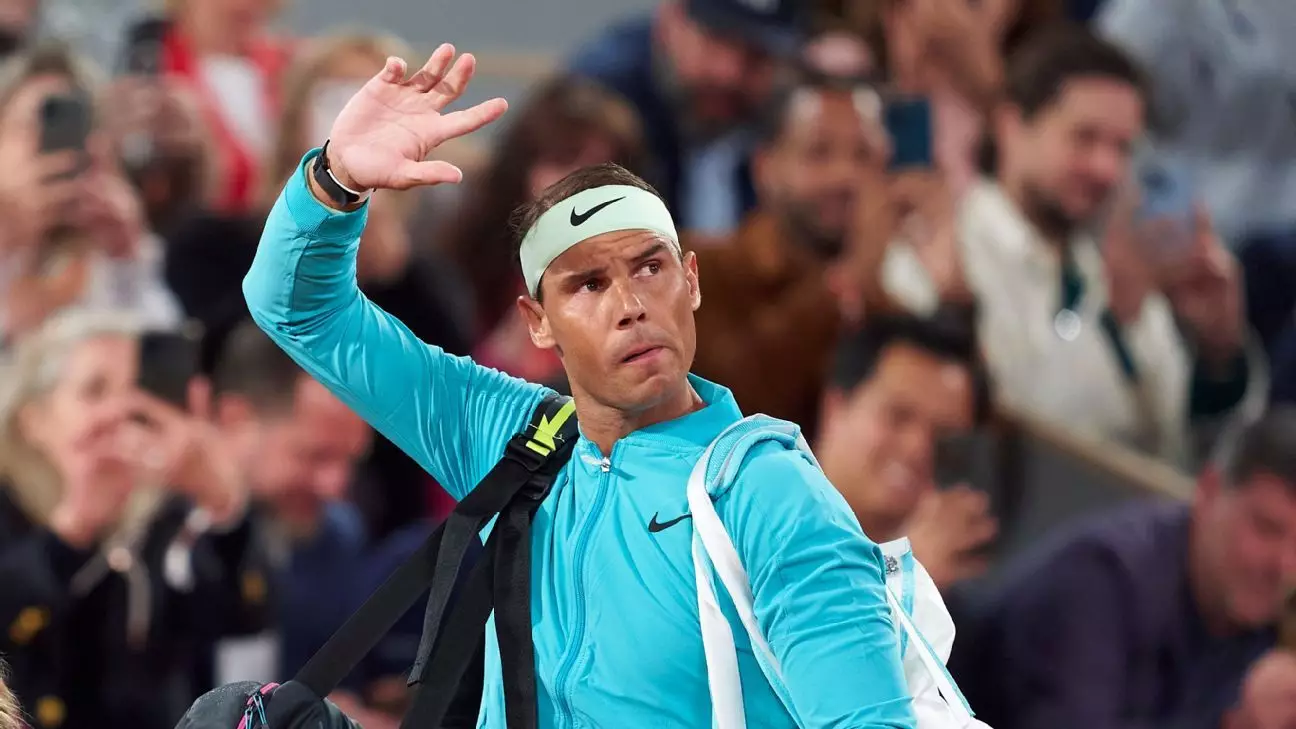As anticipation builds for the French Open, organizers are set to pay a well-deserved homage to Rafael Nadal, a titan of tennis who earned a staggering 14 titles on the iconic clay courts of Roland Garros. This tribute is especially poignant following Nadal’s retirement announcement, signifying his departure from the professional arena after a career that dazzled millions. The ceremony will take place on May 25, 2024, during the opening day of the tournament, marking a full circle for a player whose legacy is woven into the very fabric of this prestigious event.
Despite Nadal’s shocking first-round exit last year, losing to Alexander Zverev, there lingered an air of uncertainty regarding whether this would be the last time fans witnessed his magic at Roland Garros. His final competitive match came shortly thereafter during the Davis Cup in November, when he officially waved goodbye to the sport he has graced with unmatched brilliance. As Amélie Mauresmo, the tournament director, aptly noted, “Rafa made history at Roland Garros,” and it is clear that his record is not just a collection of statistics but a saga of perseverance, excellence, and formidable talent.
Honoring a Legacy
The ceremony will not only spotlight Nadal’s remarkable achievements but also emphasize the importance of recognizing past greatness in the sport. As Mauresmo hinted, there’s a vision for the future that integrates respect for the legends who have come before. While Nadal will be honored with a statue and featured in an exhibition at the tournament museum, the personal touch of having him lend his voice to the official French Open trailer adds another layer of connection between the player and his fans.
Additionally, legends from other eras will also receive their moment in the spotlight, with 2000 champion Mary Pierce and local favorite Richard Gasquet being recognized during the tournament, showcasing the French Open’s commitment to celebrating the diverse history of the sport. The presence of these icons elevates the event, turning it not merely into a competition but a festival of tennis heritage.
Financial Growth in a Demanding Landscape
Amidst the celebrations, the financial dynamics of the tournament are also a topic of discussion. This year’s total prize pool has seen a significant increase of 5.21%, bringing it to 56.352 million euros. This adjustment aligns with the demands of the sport’s elite athletes, who have been vocal about the need for better compensation and distribution of wealth at the Grand Slam level. The French Open’s willingness to engage in discussions regarding player concerns demonstrates a growing responsiveness to the realities of modern tennis, signaling a shift towards a more egalitarian approach in the sport’s financial structure.
Sticking to Tradition in a Modern Age
Interestingly, the French Open stands firm in its commitment to tradition, choosing to maintain the presence of line judges rather than fully embracing electronic line calling technologies, which have become prevalent in other Grand Slam tournaments. Gilles Moretton, chief of the French Tennis Federation, made it clear that they will not compromise on this aspect of the tournament. “I hope we’ll be able to maintain it in our tournaments in the future,” he stated, arguing passionately for the human touch that line judges provide, especially on the nuanced clay surface.
This commitment to tradition also raises questions about the future of tennis as a sport that balances innovation with the rich history that its fans cherish. The French Open’s unique position in this regard highlights the differing philosophies among the Grand Slams and adds an intriguing layer of narrative to the tournament that fans and players alike will be watching closely.
Engaging With Fans Beyond the Courts
In an effort to replicate the electric atmosphere of the 2024 Paris Olympics, the French Open is also setting up a fan zone at Place de la Concorde. The free-to-enter area will allow up to 5,000 fans to engage with the tournament in a communal setting, highlighting the importance of inclusivity and public enjoyment surrounding the games. This initiative reflects an understanding that tennis is not merely an individual sport but a shared cultural experience, and providing opportunities for collective joy can significantly enhance the overall event atmosphere.
As the clay courts prepare to welcome the world once more, the stage is set not only for tennis matches but for a celebration of legacy, tradition, and the evolving landscape of professional sports. The French Open is poised to be a spectacular confluence of honor and innovation, with Rafael Nadal’s enduring spirit illuminating this year’s event.


Leave a Reply